This year, RISS started making postcards and stickers! Just send an e-mail to buy some, postcards cost 10,- kr each and stickers 5,- kr!
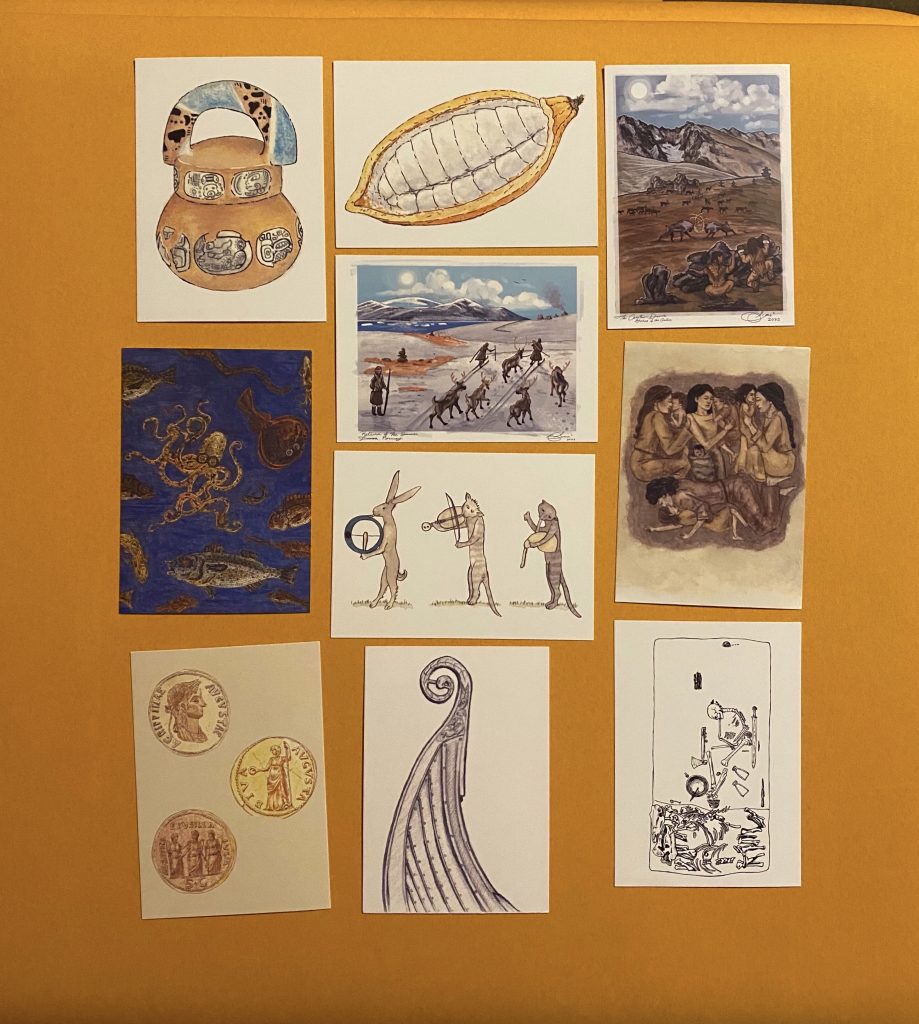
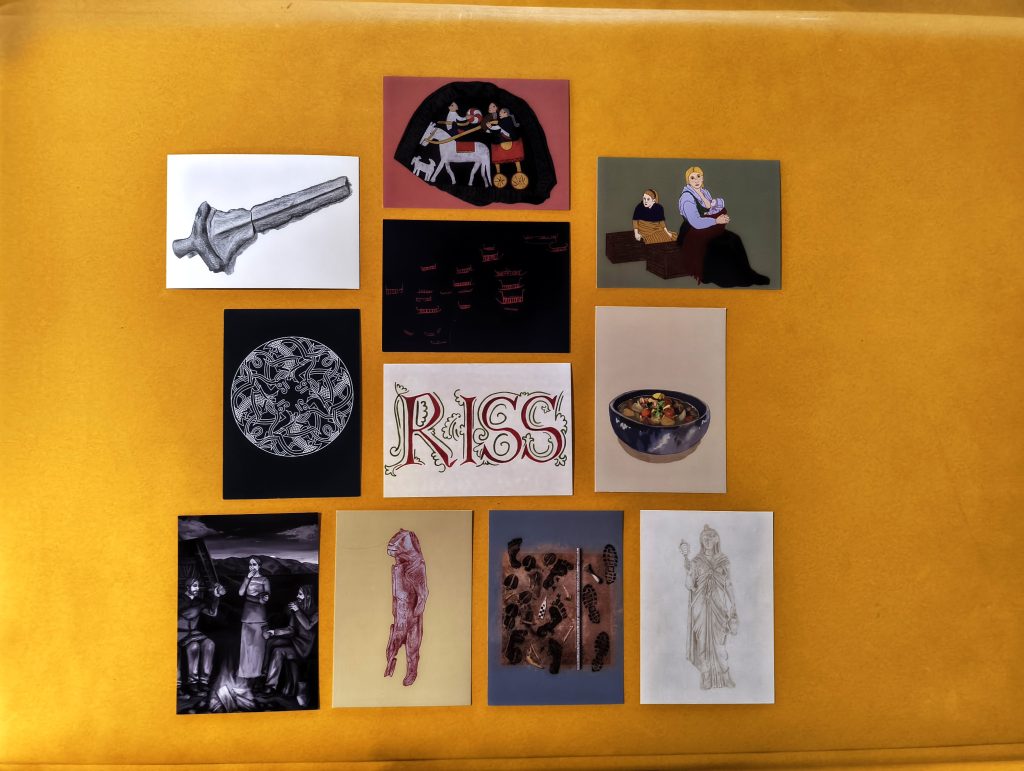
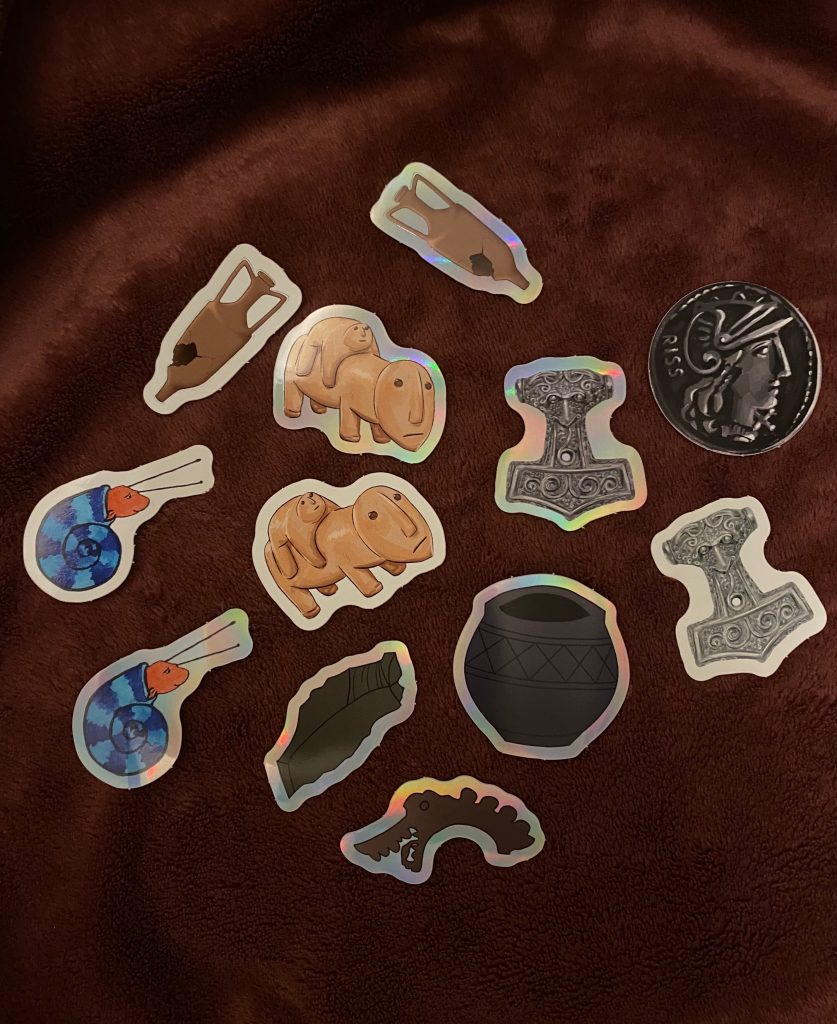
This year, RISS started making postcards and stickers! Just send an e-mail to buy some, postcards cost 10,- kr each and stickers 5,- kr!



Everything changes over time, sometimes slowly and imperceptibly, other times suddenly and dramatically. In the tenth issue since RISS’ «rebirth» in 2022, we mark the transformation of the journal itself and invite reflection on archaeological, material, cultural, and theoretical transformations alike.
We are looking for texts that explore transformations in the broadest sense of the word. This might, for example, concern how climate, weather, and natural forces transform landscapes and cultural heritage – from floods and volcanic eruptions to gradual processes such as decay and erosion. How do climate changes affect cultural heritage and our understanding of the past? What happens when rivers change their course, or when the sea reclaims the land?
Cultural and social transitions are central to this theme. We invite contributions that address migrations, cultural exchanges and assimilation, the adoption of new belief systems, and other processes through which people and identities are transformed. We also welcome texts on rites of passage and, more generally, transitions between social roles. The transition – for example, from child to adult, from woman to mother, from living to dead – can shed light on how society views transformations as a part of life. Initiation rituals in cults, excommunications, and curses can likewise be understood as forms of transformation, in which the individual either enters into or is cast out of a community.
We also welcome texts that explore how human thought, worldviews, and religions change – from the development of cognitive abilities in early humans to understandings of the past in the past, or the connection between landscape and memory (for example, in the form of lieux de mémoire). How do the ways we perceive ourselves as part of the world change?
Death itself can also be understood as a transformation, both physical and symbolic. Texts that examine death rituals, burials, deification, or magical notions of metamorphosis are therefore highly relevant. We also encourage contributions that explore transformation in mythology, magic, and witchcraft – and how such ideas are expressed in archaeological material.
Transformation can also be linked to technological, typological, or other material shifts: from stone to metallurgy, from handcraft to machine, and for example from traditional archaeological methods to digital analyses using GIS or photogrammetry. The field of archaeology itself has been in constant change, and we welcome texts that reflect on how theory, method, and practice have been transformed over time.
All texts that in various ways can shed light on the theme «Transformation» are welcome in RISS no. 10. Contributions may address any time period, any place in the world, and any branch of archaeology. We accept academic articles, essays, revised assignments, interviews, illustrations, photographs, book and exhibition reviews, as well as literary texts from students, professionals, and other interested contributors. If you wish to contribute to the next issue of RISS, please send us your submission by April 17, 2026, to rissred@gmail.com.
Language:
Scandinavian languages or English.
Name and title:
Title of your contribution. Author’s name, title and place of work.
Length, text size and line spacing:
Maximum 3000 words, font size 12 and line spacing 1,5.
Images/Illustrations/Figures:
Open Access, high resolution, numbered figures, name of photographer/author.
References and bibliography:
RISS has a popular science style, so reference to sources and a bibliography are not necessary, but can be included if desired. Feel free to attach an abstract and short list of recommended literature. References and bibliography must be in Harvard style and be a maximum of 500 words. You can use the following guideline..
Direct quotes:
Mark with “ and ” or in cursive without quotation marks if quotes exceed three lines. Direct quotes must be referenced.
Contact:
Contributions, drafts or questions can be sent to: rissred@gmail.com
Follow our accounts on Facebook /RISSUiB and Instagram @riss_uib for more information.
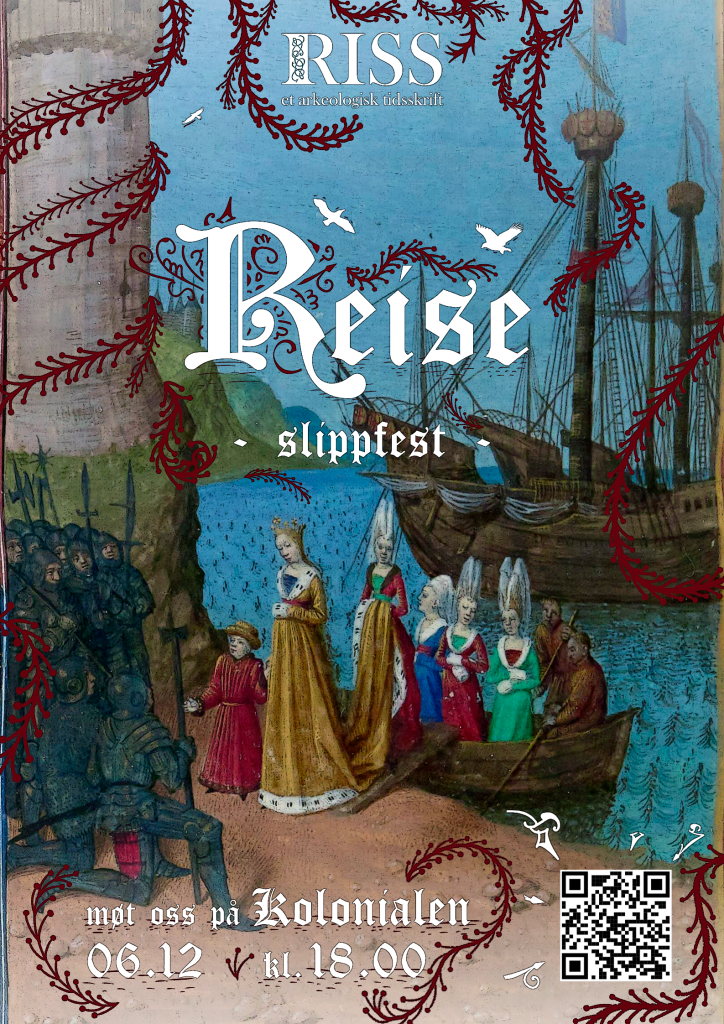
Let us know if you're coming on facebook!
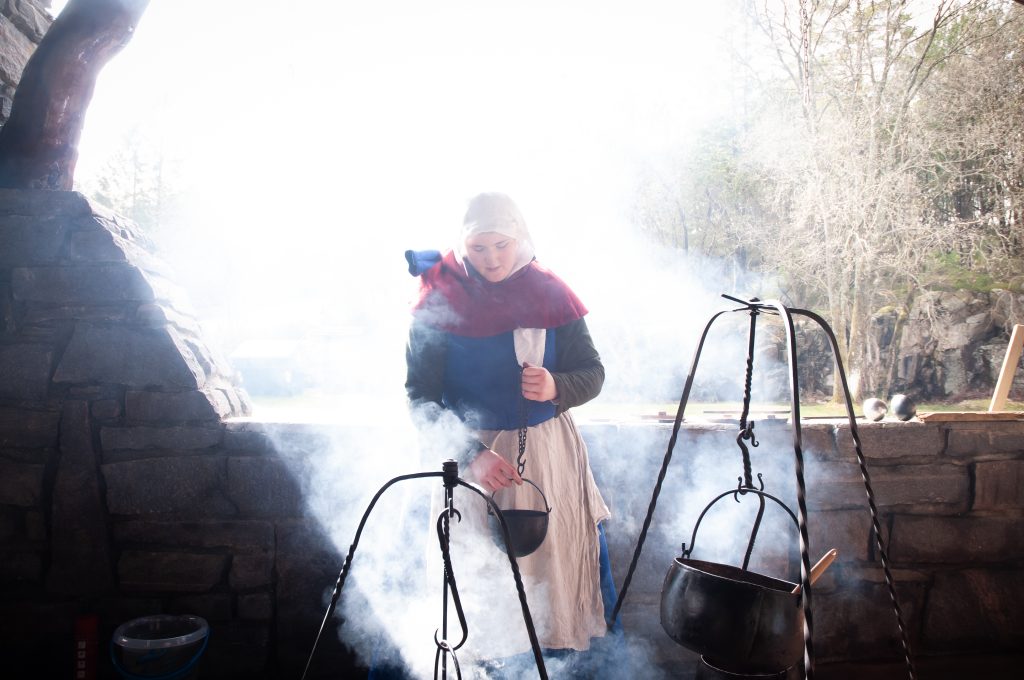
Hvordan smakte maten i middelalderen, og hva kan vi lære av kjøkkenet fra fortiden?
Bli med på en temadag på Bryggens Museum i samarbeid med RISS – Et Arkeologisk Tidsskrift, der vi utforsker middelalderens matkultur.
Når? Lørdag 27. september 2025 kl. 12:00–16:00 Hvor? Bryggens Museum Inngang: Ordinær billett til museet. Gratis for studenter ved UiB.
Facebookarrangement:
https://fb.me/e/6Eqf00qedLenker til en ekstern side.
Program
10:00–17:00
Middelalderinspirert mat i museets kafé
Møt redaksjonen bak RISS og ta en prat om mat og drikke i arkeologisk forskning
Demonstrasjoner av håndverkstradisjoner ved Bjørgvin Handverkslag
13:30–14:00
Kampshow med Kongshirden 1260
Opplev hvordan krigerne fra middelalderen trente og kjempet!
15:00–15:20
Hvordan lage middelaldermat i dag?
Et teoretisk crashkurs med Are Stoll (RISS)
15:30–16:00
Hva vet vi om middelalderens kjøkken?
Uformell samtale med:
Jens Eike Schnall, førsteamanuensis i norrøn filologi, UiB
Mathias Blobel, PhD-stipendiat i arkeologi, UiB
Ingrid Nærland, master i arkeologi, UiB
Meinrad Pohl, førsteamanuensis i historie, HVL
Vi avslutter med åpen runde for spørsmål fra publikum.
RISS er et populærvitenskapelig tidsskrift laget av arkeologistudenter ved Universitetet i Bergen i samarbeid med Norsk Arkeologisk Selskap og Institutt for arkeologi, historie, kultur- og religionsvitenskap. Tidsskriftet har blitt utgitt i over 20 år, og hvert nummer tematiserer ulike sider ved arkeologisk forskning – fra runesteiner og rituell praksis til kropp, klima og i siste utgave: mat og drikke.
Inngang:
Ordinær billett til museet.
Gratis for studenter ved UiB.
With today’s air traffic, highways, and miles of railway tracks, it may be easy to think of travel as a modern phenomenon. Archaeology clearly shows that this is not the case. From the very beginning of humanity, we have constantly been on the move. This time, we are seeking contributions that can shed light on the theme of “Journey” in various ways. We gladly welcome texts that explore the “Out of Africa” theory and how early human populations spread to all corners of the world. This includes anatomically modern humans as well as other human groups, such as Neanderthals and Denisovans. We also welcome contributions about modes of transport and transport-related infrastructure, such as ships, wagons, sleds, and roads. Discoveries of transport items in graves and the concept of the “journey to the underworld” are also valid angles.
Many human groups have had mobile lifestyles, moving through landscapes while herding or hunting animal herds, and taking advantage of seasonal resource variation. We are interested in texts that examine the many mobile settlement patterns humans have used throughout history.
There are countless reasons why people have chosen to travel – ranging from adventure to practical needs. Many have been driven by trade and economy. We warmly welcome texts on seafaring, trade routes, networks of contact, and the exchange of exotic goods. People have also embarked on religiously motivated journeys, such as pilgrimages. Politics has played a role too – we welcome texts about people who moved to form marriage alliances or went to war. Not all migration has been voluntary. War, climate disasters, and instability have always driven people to flee. We would be glad to receive contributions that address this as well. Colonialism, encounters between populations, and ethnicity are topics of interest to us. Contributions on diasporas – such as the Hanseatic League in Bergen – are also very welcome.
We are also looking for texts about the repatriation of skeletal remains and significant artifacts—items taken from a population that are now being returned. We are interested in texts that discuss DNA and isotope analyses, which can offer insight into how people moved in the past. Modern tourism is also a valid topic. Tens of thousands of people travel to famous archaeological sites each year to experience them. This contributes to wear and tear on valuable heritage material. We welcome contributions that address the ethical implications of such travel.
There are endless possible angles. All texts that shed light on the theme of “Journey” in any way are welcome in RISS No. 9. Contributions can focus on any time period, any place in the world, and any field within or related to archaeology. We accept academic articles, essays, reworked assignments, interviews, illustrations, photographs, book and film reviews, as well as fiction – from students, professionals, and other interested contributors.
If you’d like to contribute to the next issue of RISS, please send your submission by October 14th 2025 to rissred@gmail.com.
Language:
Scandinavian languages or English.
Name and title:
Title of your contribution. Author’s name, title and place of work.
Length, text size and line spacing:
Maximum 3000 words, font size 12 and line spacing 1,5.
Images/Illustrations/Figures:
Open Access, high resolution, numbered figures, name of photographer/author.
References and bibliography:
RISS has a popular science style, so reference to sources and a bibliography are not necessary, but can be included if desired. Feel free to attach an abstract and short list of recommended literature. References and bibliography must be in Harvard style and be a maximum of 500 words.
Direct quotes:
Mark with “ and ” or in cursive without quotation marks if quotes exceed three lines. Direct quotes must be referenced.
Contact:
Contributions, drafts or questions can be sent to: rissred@gmail.com
Follow our accounts on Facebook /RISSUiB and Instagram @riss_uib for more information.
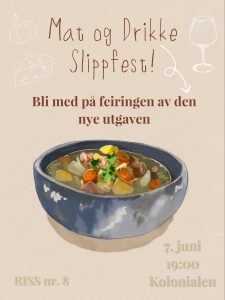
The new edition of RISS, No. 8 Food and Drink, is almost ready, and we want to celebrate with a little release party on June 7th at Kolonialen!
This edition features articles on everything from cocoa, the grave drink of the Egtved Girl, traditional Icelandic food, and much more! As always, we’ll be selling the new issue, previous editions, and merch!
Without food and drink, the hero is no good” goes the classic Norwegian proverb, and this has been true for all people in all time periods. Food is a basic need for survival, and which resources people have chosen to exploit to feed themselves and their families have largely shaped societies and the lives of individuals. What people have chosen as a basis for sustenance has shaped the relationship of human groups to their surroundings and nature. Whether you plow and shape the land to cultivate, whether you walk across plains, mountains and forests in search of game, follow herds of animals on long migration routes, row out into the fjord to fish, collect nuts, root vegetables or shells; all of this shapes which qualities and tools you acquire, and how you live in connection with the landscape.
This time we want texts that deal with food and drink, and the social sphere around this from an archaeological perspective. As food and drink have been an essential part of the lives of every human being who has ever lived, the archaeological source material is both large and varied. We are happy to accept texts about, for example, bones, nutshells, ceramic containers and cooking utensils. We also gladly accept texts with a scientific angle, such as pollen analyses, which can tell us about cultivation or grazing, or isotope analyses of bones, which can tell us a lot about a person’s diet.
Forholdet mennesker har til mat og drikke kan forøvrig ikke reduseres til ren overlevelse, men har sterke koblinger til sosiale, religiøse og økonomiske kontekster. Hvem har en plass rundt bordet under et stort gilde? Hvem har det staseligste drikkeserviset? Mat, drikke og måltider har i flere tilfeller blitt brukt til å markere status. I tillegg har offermåltider og alkoholholdige drikker hatt rituelle betydninger i flere samfunn. Matvarer har blitt handlet over store avstander og inngått i intrikate handelsnettverk. I tillegg har enkelte typer mat og drikke hatt medisinsk bruk. Vi ber derfor om tekster som tar for seg gildekultur, offermåltider, handel, medisin og lignende, altså mat og drikke i en større samfunnskontekst.
Det finnes også mørke sider ved mat og drikke, og vi tar gjerne imot tekster som diskuterer temaer som sultkatastrofer, feilernæring, alkoholisme eller andre av de dystrere trekkene ved mat og drikke.
Alle tekster som på ulike måter kan belyse temaet “Mat og drikke” er velkomne i RISS nr. 8. Bidragene kan omhandle alle tidsperioder, alle steder i verden og alle forskningsområder innenfor, eller beslektet med, arkeologi. Vi tar imot fagartikler, essays, bearbeidede oppgaver, intervjuer, illustrasjoner, foto, bok- og filmanmeldelser, og skjønnlitterære tekster fra studenter, fagpersoner og andre interesserte. Denne gangen tar vi også gjerne imot oppskrifter basert på historiske eller arkeologiske kilder.
If you’d like to contribute to the next issue of RISS, please send your submission by 15. april 2025 to rissred@gmail.com
Language:
Scandinavian languages or English.
Name and title:
Title of your contribution. Author’s name, title and place of work.
Length, text size and line spacing:
Maximum 3000 words, font size 12 and line spacing 1,5.
Images/Illustrations/Figures:
Open Access, high resolution, numbered figures, name of photographer/author.
References and bibliography:
RISS has a popular science style, so reference to sources and a bibliography are not necessary, but can be included if desired. Feel free to attach an abstract and short list of recommended literature. References and bibliography must be in Harvard style and be a maximum of 500 words.
Direct quotes:
Mark with “ and ” or in cursive without quotation marks if quotes exceed three lines. Direct quotes must be referenced.
Contact:
Contributions, drafts or questions can be sent to: rissred@gmail.com.
Follow our accounts on Facebook /RISSUiB and Instagram @riss_uib for more information.
The relationship humans have with food and drink cannot be reduced to pure survival, but has strong links to social, religious and economic contexts. Who has a seat around the table during a large feast? Who has the most magnificent drinking vessel? Food, drink and meals have in many cases been used to mark status. In addition, sacrificial meals and alcoholic beverages have had ritual meanings in several societies. Food products have been traded over great distances and entered into intricate trade networks. In addition, certain types of food and drink have had medicinal uses. We therefore ask for texts that deal with feast culture, sacrificial meals, trade, medicine and the like, i.e. food and drink in a larger social context.
There are also dark sides to food and drink, and we are happy to accept texts that discuss topics such as famines, malnutrition, alcoholism or other of the more gloomy features of food and drink.
All texts that can shed light on the theme “Food and Drink” in various ways are welcome in RISS no. 8. Contributions can deal with all time periods, all places in the world and all research areas within, or related to, archaeology. We accept professional articles, essays, adapted assignments, interviews, illustrations, photos, book and film reviews, and literary texts from students, professionals and other interested parties. This time we are also happy to accept recipes based on historical or archaeological sources.
If you would like to contribute to the next issue of RISS, send us your contribution by April 15, 2025 to rissred@gmail.com.
Languages:
Scandinavian or English.
Name and Title:
Title of your contribution. Author’s name, title and place of work.
Length, text size and line spacing:
Maximum 3000 words, font size 12 and line spacing 1,5.
Images/Illustrations/Figures:
Open Access, high resolution, numbered figures, name of photographer/author.
References and bibliography:
References and bibliography are not necessary. Do include an abstract and a literature list for further reading.
Direct quotes:
Mark with “ and ” or in cursive without quotation marks if quotes exceed three lines. Direct quotes must be referenced.
Contact:
Contributions, drafts or questions can be sent to rissred@gmail.com.
Follow our accounts on Facebook /RISSUiB and Instagram @riss_uib for more information.[:]
[:nb]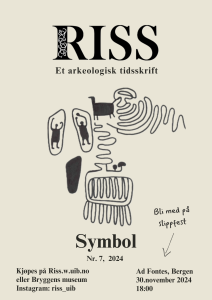
Vi i redaksjonen gleder oss over å kunne invitere dere til slippfest for nr. 7 «Symbol»!
I denne utgaven utforsker vi menneskets evne til å bruke symboler, en egenskap som går tilbake til våre eldste forfedre. Gjennom tekster som spenner fra 73.000 år gamle okertegninger, til hakekorsets symbolikk, gir RISS nr. 7 en fascinerende innsikt i hvordan vi har kommunisert ideer, tro og identitet gjennom tidene.
Nummeret har bidrag fra professorer og studenter både fra UiB og utenfor, det innebefatter artikler, dikt, illustrasjoner med kommentar, og en bokanmeldelse.
Vi håper å se mange av dere på slippfesten, si ifra om du kommer på facebook!
[:en]
We in the editorial office are delighted to invite you to the release party for nr. 7 «Symbol»!
In this edition, we explore humanity’s ability to use symbols, a trait that dates back to our earliest ancestors. Through texts ranging from 73,000-year-old ochre drawings to the symbolism of the equilateral cross (swastika), RISS nr. 7 offers a fascinating insight into how we have communicated ideas, beliefs, and identity throughout history.
This issue features contributions from professors and students both from UiB and beyond, including articles, poetry, illustrations with commentary, and a book review.
We hope to see many of you at the release party, let us know if you’re coming on facebook!
[:]
[:nb]Velkommen til åpent møte for Riss og skålgropa!
Tidspunkt: 23. august kl. 17:00
Sted: Auditorium A på Sydneshaugen skole
På møtet blir det delt mer detaljert info om hva Riss og skålgropa går ut på, og det blir mulig å melde seg inn for de som er interessert. I tillegg blir det gøy quiz og gratis pizza. Etter møtet er ferdig kan de som vil bli med til ad fontes for å nyte god stemning, godt selskap og edle dråper! Håper å se dere der!
For å sørge for at vi har nok pizza, si ifra om du kommer – enten på facebook arrangementet eller via e-mail![:en]Welcome to the open meeting for Riss og skålgropa!
Time: 23 August at 17:00
Place: Auditorium A at Sydneshaugen school
At the meeting, more detailed information will be shared about what Riss og skålgropa is all about, and it will be possible for those who are interested to register. In addition, there will be a fun quiz and free pizza. After the meeting is over, those who want to can join us at ad fontes to enjoy a good atmosphere, good company and refreshing drinks! Hope to see you there!
To make sure we have enough pizza, please let us know if you’re attending – either on the facebook event or via e-mail![:]
[:nb]I Blombos-hulen i Sør-Afrika har man funnet de eldste bevisene for symbolsk tankeevne, en tegning av rød oker på en stein og en okerklump med et innrisset mønster. For 73.000 år siden bodde det mennesker der som kunne se på en ting, og se noe mer enn tingen selv. Fra da av har menneskers bruk av symboler eksplodert. Derfor har RISS-redaskjonen denne gangen bestemt seg for å utforske temaet “symbol”. Bare det at du nå kan dekode bokstavene, og forstå hva som står skrevet i denne forfatterveiledningen illustrerer hvor integrert symbolbruk er i menneskets sinn og samfunn. Uttrykket “symbol” rommer svært mye. Vi er interessert i tekster som belyser alt fra tidlig symbolsk tankegang, som funnene i Blombos-hulen, til moderne symbolbruk.
Tekster som omhandler kunst er velkomne. Dette inkluderer også kunstformer som bergkunst og graffiti i byer. Hvilke symboler har fortidens individer valgt å hugge, risse, eller male inn i berg, bygninger eller andre objekter, og hva kan ha vært betydningen bak dem? Språk er et aspekt av symbolbruken vår, og er en evne homo sapiens antagelig har delt med neandertalere og muligens andre menneskearter. Tekster om språk, skriftspråk og bruken og utviklingen av disse tar vi gjerne imot. Her kan for eksempel funnet av Svingerudsteinen, det til nå eldste funnet av runer, være et relevant tema. Det samme gjelder bruk av hieroglyfer, kileskrift og andre skriftspråk og inskripsjoner. Diskusjonen om andre menneskearters språkevner, for eksempel neandertalerne, er også relevant. Handlinger kan også være symboler. Vi tar gjerne imot innlegg om ritualer, eller andre symbolsk ladede handlinger som har blitt utført av fortidige individer.
Mennesker har ladet ulike symboler med ulike betydninger i uminnelige tider. Vi ønsker oss tekster om blant annet religiøse symboler, politiske symboler, symboler på etnisk tilhørighet, identitetssymboler og ikke minst statussymboler. Tekster som diskuterer hvordan mennesker har markert sin status gjennom tidene, og hvordan dette vises i det arkeologiske materialet gjennom blant annet funn av smykker, våpen, ekstravagante graver og storslåtte offerhandlinger, er velkomne. Hvordan har herskere og guder blitt avbildet og fremstilt? Hva med vanlige mennesker? Hva slags symbolbruk har de på bunnen av samfunnet brukt til å uttrykke seg?
Symbolbruk kan være opphøyet og hellig, eller hverdagslig og til og med humoristisk eller vulgær. Alle tekster som på ulike måter kan belyse temaet “symbol” er velkomne i RISS nr. 7. Bidragene kan omhandle alle tidsperioder, alle steder i verden og alle forskningsområder innenfor arkeologi. Vi tar imot fagartikler, essays, bearbeidede oppgaver, intervjuer, illustrasjoner, foto, bok- og filmanmeldelser, og skjønnlitterære tekster fra studenter, fagpersoner og andre interesserte. Om du ønsker å bidra i neste nummer av RISS, send oss ditt bidrag innen 14. oktober 2024 til riss@uib.no.
Language:
Scandinavian languages or English.
Name and title:
Title of your contribution. Author’s name, title and place of work.
Length, text size and line spacing:
Maximum 3000 words, font size 12 and line spacing 1,5.
Images/Illustrations/Figures:
Open Access, high resolution, numbered figures, name of photographer/author.
References and bibliography:
RISS has a popular science style, so reference to sources and a bibliography are not necessary, but can be included if desired. Feel free to attach an abstract and short list of recommended literature. References and bibliography must be in Harvard style and be a maximum of 500 words.
Direct quotes:
Mark with “ and ” or in cursive without quotation marks if quotes exceed three lines. Direct quotes must be referenced.
Contact:
Contributions, drafts or questions can be sent to: riss@uib.no.
Follow our accounts on Facebook /RISSUiB and Instagram @riss_uib for mer informasjon.[:en]The RISS editorial team has decided to explore the theme «symbol» this semester. Just the fact that you can now decode the letters and understand what is written in this author’s guide illustrates how integrated the use of symbols is in the human mind and society. The term «symbol» covers a lot. We are interested in texts that shed light on everything from early symbolic thought, such as the discoveries in the Blombos cave, to modern use of symbols.
Texts dealing with art are welcome. This also includes art forms such as rock art and urban graffiti. What symbols have individuals of the past chosen to carve, scratch, or paint into rocks, buildings or other objects, and what might have been the meaning behind them? Language is an aspect of our use of symbols, and is an ability homo sapiens presumably shared with Neanderthals and possibly other human species. We welcome texts about language, written language and the use and development of these. Here, for example, the finding of the Svingerudsteinen, the oldest find of runes to date, can be a relevant topic. The same applies to the use of hieroglyphs, cuneiform and other written languages and inscriptions. The discussion about the language abilities of other human species, such as the Neanderthals, is also relevant. Actions can also be symbols. We welcome submissions about rituals, or other symbolically charged actions that have been carried out by individuals in the past.
People have charged different symbols with different meanings since time immemorial. We want texts about, among other things, religious symbols, political symbols, symbols of ethnic affiliation, identity symbols and, not least, status symbols. Texts that discuss how people have marked their status throughout the ages, and how this is shown in the archaeological material through, among other things, finds of jewellery, weapons, extravagant graves and magnificent acts of sacrifice, are welcome. How have rulers and gods been depicted and portrayed? What about ordinary people? What kind of symbols have those at the bottom of society used to express themselves?
Symbolic use can be exalted and sacred, or mundane and even humorous or vulgar. All texts that can shed light on the theme «symbol» in various ways are welcome in RISS No. 7. Contributions can deal with all time periods, all places in the world and all research areas within archaeology. We accept professional articles, essays, processed assignments, interviews, illustrations, photos, book and film reviews, and fiction texts from students, professionals and other interested parties. If you would like to contribute to the next issue of RISS, send us your contribution by 14 October 2024 to riss@uib.no.
Languages:
Scandinavian or English.
Name and Title:
Title of your contribution. Author’s name, title and place of work.
Length, text size and line spacing:
Maximum 3000 words, font size 12 and line spacing 1,5.
Images/Illustrations/Figures:
Open Access, high resolution, numbered figures, name of photographer/author.
References and bibliography:
References and bibliography are not necessary. Do include an abstract and a literature list for further reading.
Direct quotes:
Mark with “ and ” or in cursive without quotation marks if quotes exceed three lines. Direct quotes must be referenced.
Contact:
Contributions, drafts or questions can be sent to riss@uib.no.
Follow our accounts on Facebook /RISSUiB and Instagram @riss_uib for more information.[:]